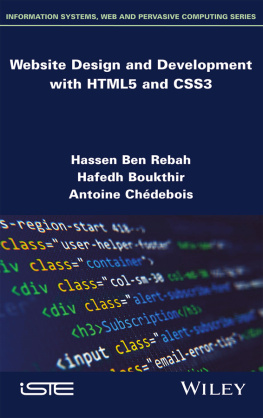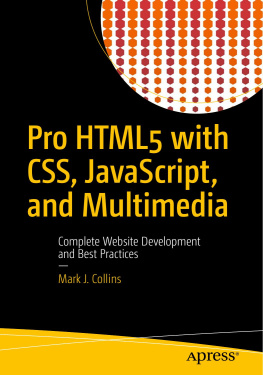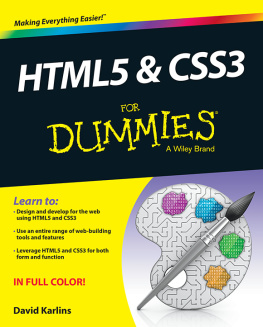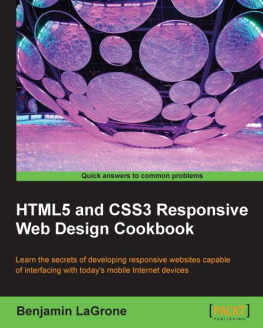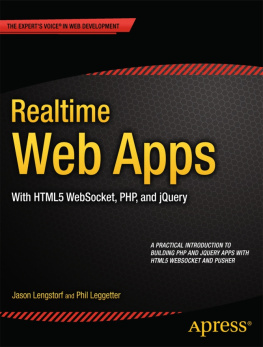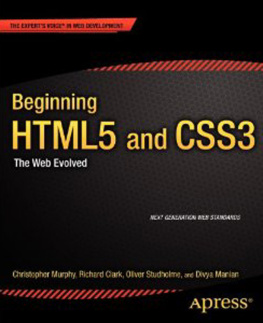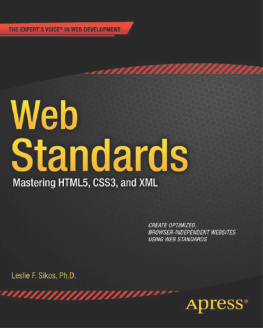Hassen Ben Rebah - Website Design and Development with HTML5 and CSS3
Here you can read online Hassen Ben Rebah - Website Design and Development with HTML5 and CSS3 full text of the book (entire story) in english for free. Download pdf and epub, get meaning, cover and reviews about this ebook. year: 2021, genre: Computer. Description of the work, (preface) as well as reviews are available. Best literature library LitArk.com created for fans of good reading and offers a wide selection of genres:
Romance novel
Science fiction
Adventure
Detective
Science
History
Home and family
Prose
Art
Politics
Computer
Non-fiction
Religion
Business
Children
Humor
Choose a favorite category and find really read worthwhile books. Enjoy immersion in the world of imagination, feel the emotions of the characters or learn something new for yourself, make an fascinating discovery.
- Book:Website Design and Development with HTML5 and CSS3
- Author:
- Genre:
- Year:2021
- Rating:3 / 5
- Favourites:Add to favourites
- Your mark:
- 60
- 1
- 2
- 3
- 4
- 5
Website Design and Development with HTML5 and CSS3: summary, description and annotation
We offer to read an annotation, description, summary or preface (depends on what the author of the book "Website Design and Development with HTML5 and CSS3" wrote himself). If you haven't found the necessary information about the book — write in the comments, we will try to find it.
Website Design and Development with HTML5 and CSS3 — read online for free the complete book (whole text) full work
Below is the text of the book, divided by pages. System saving the place of the last page read, allows you to conveniently read the book "Website Design and Development with HTML5 and CSS3" online for free, without having to search again every time where you left off. Put a bookmark, and you can go to the page where you finished reading at any time.
Font size:
Interval:
Bookmark:

Series Editor Jean-Charles Pomerol
Hassen Ben Rebah
Hafedh Boukthir
Antoine Chdebois

First published 2021 in Great Britain and the United States by ISTE Ltd and John Wiley & Sons, Inc.
Apart from any fair dealing for the purposes of research or private study, or criticism or review, as permitted under the Copyright, Designs and Patents Act 1988, this publication may only be reproduced, stored or transmitted, in any form or by any means, with the prior permission in writing of the publishers, or in the case of reprographic reproduction in accordance with the terms and licenses issued by the CLA. Enquiries concerning reproduction outside these terms should be sent to the publishers at the undermentioned address:
ISTE Ltd
27-37 St Georges Road
London SW19 4EU
UK
www.iste.co.uk
John Wiley & Sons, Inc
111 River Street
Hoboken, NJ 07030
USA
www.wiley.com
ISTE Ltd 2021
The rights of Hassen Ben Rebah, Hafedh Boukthir and Antoine Chdebois to be identified as the authors of this work have been asserted by them in accordance with the Copyright, Designs and Patents Act 1988.
Library of Congress Control Number: 2021940275
British Library Cataloguing-in-Publication Data
A CIP record for this book is available from the British Library
ISBN 978-1-78630-696-8
When Hassen Ben Rebah contacted me to write the foreword to his new book on HTML5 and CSS3 in collaboration with his colleagues, I was surprised by the invitation. One can only accept such an honor. Hassen Ben Rebah is a university teacher recognized for his know-how and knowledge of web programming (HTML5, CSS3, JavaScript, etc.). He is excellent at passing his knowledge on to others. Two people have embarked on this new adventure with him: Antoine, a lead developer at Amazon, and Hafedh, a fellow teacher. The collaboration of these three authors promises to culminate in a fine work.
It is also worth remembering that 2020 is the 10th year that HTML5 has been creating a stir in the world for web designers! What better time to produce this new opus on HTML5? Of course, the first official version was released in 2014, but we had all been eagerly awaiting it since 2010. The HTML5 specifications are the longest of all the major versions of HTML to be written since it came into existence. This just shows the power of this version!
Today, we cannot talk about HTML5 without associating it with CSS3. This version of stylesheets has existed for 20 years, yet it has only been effectively integrated into modern navigators for a quarter of its life. Modernity, indeed, as CSS3 offers a veritable arsenal of selectors, use of web fonts, gradients, shadows and animations without a single line of JavaScript! The only limit to your creativity will be your own imagination.
Who better than two teachers and a lead developer to explain the magic of these two computer languages? Hassen, Antoine and Hafedh will accompany you throughout this book in your understanding and mastery of the indissociable pairing that is HTML5 and CSS3. In it you will find a whole repository for each language, as well as concrete examples of their use. This book will become your new bedside reading.
Teddy PAYET
Lead Developer CTO Freelance
July 2021
This book discusses website programming through the study of the HTML5 and CSS3 web development languages. The first is used for the structuring and content of a site, and the second for graphic design and formatting.
The book begins by focusing on studying the HTML5 and CSS3 languages; it then presents the procedure for creating a website (choice of architecture, hosting, updating, referencing, etc.) as well as the key rules to be applied in order to ensure the success of the project, in particular by better meeting user needs.
In addition, there are examples illustrating the majority of the chapters in the book. This work also features corrected practical exercises, structured according to an expanding logic: from designing a simple HTML5 page to creating a professional website. These exercises serve to teach readers the basic concepts they need to master if they wish to create a website: page structure, element positioning, insertion of forms, tables, images, videos, audios, etc.
All the source codes of the practical exercises presented in this book are available on GitHub.
This book is intended for both students and academics starting out in the field of web page development and creation, and also for website designers and web designers wishing to develop their creations.
July 2021
The Web and its Future
At the turn of the 21st century, information, including access to the Internet, became the basis for personal, economic and political progress. A popular name for the Internet is the information highway, and it became the place where one goes to find the latest financial news, to browse library catalogs, to exchange information with colleagues or to participate in a lively political debate. The Internet is the tool that will lead you, beyond telephones, faxes and isolated computers, to a rapidly growing network of information without borders.
The Internet complements the traditional tools you use to collect information, graphical data, view the news and connect with others. The Internet is shrinking the world; bringing information, skills and knowledge on almost all subjects imaginable directly to your computer.
The Internet is what we call a meta network, that is a network of networks that covers the entire world. It is impossible to give an exact number of the amount of networks or users that make up the Internet, but it easily exceeds several billion (4.57 billion Internet users in the first quarter of 2020 according to the site blogdumoderateur).
The Internet was first designed by the Department of Defense, as a means of protecting US government communications systems in the event of a military attack. The original network, baptized ARPANET (after the Advanced Research Projects Agency that developed it), evolved into a communication channel between the entrepreneurs, military personnel and academic researchers who contribute to ARPA projects.
In 1957, the Advanced Research Project Agency (ARPA) was created in the United States to lead a small number of projects aimed at ensuring scientific and technical predominance over the Russians. Making up this organization was some of the United States most valued scientists.
In 1967, Lawrence G. Roberts, who had recently chaired the ARPA computer network project, presented these scenarios for the ARPANET (Advanced Research Projects Agency NETwork). Meanwhile, that same year, Donald Davies and Robert Scantlebury of the National Physical Laboratory (NPL) in the United Kingdom announced the design of a packet-switching network.
In 1969, the ARPANET began to operate, initially linking up four universities. Using this connection, four facilities were able to transfer data and perform lengthy calculations, remotely, on multiple computers.
During the 1970s, research laboratories gradually linked up to the ARPANET.
Next pageFont size:
Interval:
Bookmark:
Similar books «Website Design and Development with HTML5 and CSS3»
Look at similar books to Website Design and Development with HTML5 and CSS3. We have selected literature similar in name and meaning in the hope of providing readers with more options to find new, interesting, not yet read works.
Discussion, reviews of the book Website Design and Development with HTML5 and CSS3 and just readers' own opinions. Leave your comments, write what you think about the work, its meaning or the main characters. Specify what exactly you liked and what you didn't like, and why you think so.

